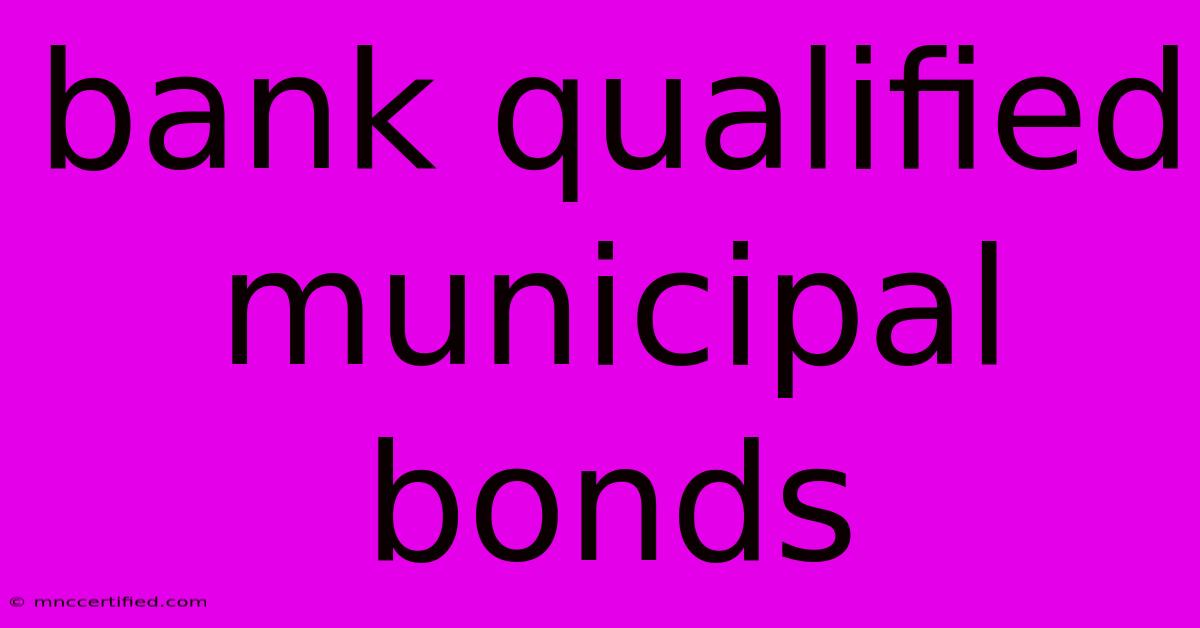Bank Qualified Municipal Bonds

Table of Contents
Bank Qualified Municipal Bonds: A Deep Dive for Investors
Municipal bonds, often seen as a safe haven for investors seeking tax-advantaged returns, offer a diverse landscape of investment opportunities. Within this landscape, bank qualified municipal bonds stand out, offering unique benefits that make them particularly attractive to certain investors. This comprehensive guide will explore the nuances of bank qualified municipal bonds, explaining their features, advantages, and potential drawbacks.
What are Bank Qualified Municipal Bonds?
Bank qualified municipal bonds are a specific type of municipal bond that meets certain criteria established by the Internal Revenue Code (IRC). These criteria primarily focus on the issuer's size and the bond's purpose. The key characteristic is that banks can purchase these bonds and deduct 80% of the carrying costs associated with the investment from their taxable income. This significant tax benefit incentivizes banks to invest in these bonds, ultimately increasing demand and potentially influencing their yield.
Key Characteristics of Bank Qualified Bonds:
- Issuer Size Restrictions: The issuing municipality must meet specific population limits and debt limits to qualify for bank qualification. These limits are designed to ensure that the program benefits smaller municipalities and prevents larger entities from dominating the market.
- Purpose Restrictions: The proceeds from the bond issuance must be used for specific, authorized purposes. These typically include public works projects, infrastructure improvements, and other essential governmental functions. The specifics vary depending on state and local regulations.
- Limited Issuance: Because of the stringent requirements, the supply of bank qualified municipal bonds is generally less than other types of municipal bonds. This limited supply can affect pricing and yields.
Advantages of Bank Qualified Municipal Bonds
Several advantages make bank qualified municipal bonds appealing to investors, both directly and indirectly:
- Enhanced Tax Advantages: The 80% deduction on carrying costs for banks translates into potentially higher yields for investors. While investors don't directly receive the 80% deduction, the increased demand driven by the bank benefit can indirectly lead to more competitive yields.
- Potential for Higher Returns: The limited supply and increased demand can result in higher yields compared to other, more readily available municipal bonds. However, it's crucial to remember that higher yields often come with slightly higher risk.
- Diversification: Adding bank qualified municipal bonds to a portfolio can enhance diversification, reducing overall portfolio risk by adding a unique asset class.
Disadvantages of Bank Qualified Municipal Bonds
Despite their advantages, investors should be aware of potential drawbacks:
- Liquidity: Bank qualified bonds may experience lower liquidity compared to larger, more widely held municipal bonds. This can make selling them before maturity more challenging and may require accepting a lower price.
- Complexity: Understanding the specific requirements and regulations surrounding bank qualified bonds can be more complex than understanding other municipal bond types. Thorough due diligence is essential.
- Credit Risk: While municipal bonds are generally considered less risky than corporate bonds, they still carry credit risk. The creditworthiness of the issuing municipality is crucial in determining the bond's overall risk profile.
How to Invest in Bank Qualified Municipal Bonds
Investing in bank qualified municipal bonds is typically done through brokerage accounts that offer access to the municipal bond market. Working with a qualified financial advisor experienced in municipal bonds is highly recommended. They can help you understand the complexities, assess your risk tolerance, and select bonds that align with your investment goals.
Finding Information on Bank Qualified Municipal Bonds
Information on specific bank qualified bonds is often found through municipal bond dealers and financial information services. Websites specializing in municipal bonds frequently list available issuances, along with relevant details like maturity dates, interest rates, and credit ratings.
Keyword Considerations for SEO:
This article uses numerous keywords organically, including variations of: "bank qualified municipal bonds," "municipal bonds," "tax-advantaged investments," "bank deduction," "carrying costs," "municipal bond yields," "credit risk," "liquidity," "investment portfolio diversification," "municipal bond investing." The use of these keywords is natural and semantically relevant, aiming for a high search ranking without compromising readability. Furthermore, off-page SEO would involve promoting this article through relevant financial blogs, forums, and social media channels.

Thank you for visiting our website wich cover about Bank Qualified Municipal Bonds. We hope the information provided has been useful to you. Feel free to contact us if you have any questions or need further assistance. See you next time and dont miss to bookmark.
Featured Posts
-
Last Minute Cut Chargers Mnf Roster
Nov 26, 2024
-
Bonding Aluminium To Aluminium
Nov 26, 2024
-
How Much Is Track Day Insurance
Nov 26, 2024
-
Slide In Truck Camper Insurance
Nov 26, 2024
-
Composite Edge Bonding Near Me
Nov 26, 2024